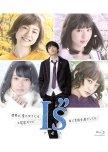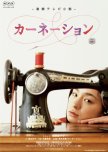
A Love Story Between Two Musicians
Yell is the story of Yuichi and Oto who managed to meet, fall in love and marry at a time in Japanese history when most marriages were arranged. The series is a relatively faithful biography of the composer Koseki Yuji whose music is showcased throughout. (There is a one-week arc where the series cheerfully veers into the paranormal, and the historicity of that particular week may be in doubt.) The series follows Yuichi from his childhood where he was bullied for having a stutter through to a happy retirement following a long and successful career in the music industry making hit songs in the pre-war era, writing propaganda songs during the war, and composing the music for radio serials, film and stage productions after the war. Kubota Masataka plays this mild and gentle soul from high school through retirement.Yuichi's soulmate is Oto, the second daughter of a Christian family who had a small business making saddles. She encounters a famous operatic soprano when she is young and decides to become an opera singer. Oto is played by Nikaido Fumi whose voice is surprisingly convincing in the role.
The focus of this series is centered more on Yuichi than Oto mostly because the roles of wives and mothers were comparatively limited in early to mid century Japan, and so there are fewer family anecdotes about her to be incorporated into the series once they settled down and had their daughter Hana. Nevertheless, the show is pretty balanced between the two characters until the war when Yuichi's stories tend to dominate. There are also many lovely side stories involving the couple's siblings, friends and daughter.
The height of this series is Yuichi's involvement in the war. Yuichi proudly writes music for the war effort until late in the war when he makes a fateful morale trip near the front lines in Burma where he is confronted with the consequences of his support of the war - to the point that he stops composing for a period, and eventually writes a now beloved and haunting song for peace. The script really does not pull any punches in its portrayal of wartime Japan , showing the country's military fervor and its dire consequences, and this section of the series is quite moving.
Other than the war years, the tone of the series is pretty light with the dramatic obstacles being those usually associated with trying to establish oneself in the music industry and the expected parental objection to the match of Yuichi and Oto. The series was in production when the pandemic hit and for the first time in decades NHK had to put its asadora on hiatus for a few weeks. I don't think that the hiatus had any noticeable effect on the quality or the story, but the series ended up slightly shorter at 24 weeks instead of 26. A bigger impact on the length of the series arose from the decision to move from six episodes per week down to five, but I believe that decision was made prior to the pandemic and will remain true for the asadoras from Yell on. Thus, Yell has 120 episodes when prior asadora typically had 156.
Yell is an above average asadora with a few a particularly stellar weeks. The last week is a bit of a hodgepodge trying to complete a final romantic arc, doing the final payoff to a setup in Ep. 1, and building to a fanciful denouement in Ep. 119 to match the unusual opening scenes of the series. Ep. 120 is a final concert of Koseki's music with Nikaido concluding the series with a lovely performance of The Bells of Nagasaki.
Cet avis était-il utile?

Yuube wa Otanoshimi Deshita ne
4 personnes ont trouvé cette critique utile
Cette critique peut contenir des spoilers
Like Dad of Light, Yuube wa Otanoshimi Deshita ne is a pretty blatant ad for an MMORPG which serves as a conduit for two people to learn to express their emotions. This time the MMORPG is Dragon Quest X and the emotion is romance here between the stunning Miyako (Honda Tsubasa) and the relentlessly herbivorous Takumi (Okayama Amane). Like Good Morning Call the plot has the two unexpectedly sharing a house together because, in this case, they were guildies in the game and both playing characters of opposite gender and assuming the other was the same gender as their character. Ha. Ha. But that matters for barely an episode before they find that they enjoy each other IRL, and the main boss fight for the series over all is the tired, tropey, ineffectual man-boy character of Takumi which is eventually defeated by virtually every other character in the series including Miyako's ex telling him that, no, she really does like him.Tsubasa shines and Amane whines, and Terrace House's Kakei Miwako has a lovely turn as a comedic vixen playing Ayano, Miyako's best friend. The story is short and sweet, and ends on a kiss.
Cet avis était-il utile?

I initially thought this production was nearly as good. My initial criticism of the first ten episodes was only that it makes some elements of the story far more explicit and is somewhat worse for doing so. There are countless examples, but here's one. The protagonist is icy and detached. In the original, the character is simply portrayed that way. In this version, an early minor character remarks that she's icy and detached. Lee Bo Young's performance is excellent and did not need the explicit framing of her character. Everything is similarly spelled out: the extent of the Hye Na's abuse, her birth mother's motivations, her birth mother's boyfriend's motivations, etc. Jung Seo Kung is writing in crayon compared to Sakamoto Yuji. Clarity in writing is generally a good thing, but subtlety can be more effective and that's certainly the case here.
Far worse, however, are episodes 11 and 12 in which Yoon Bok and Soo Jin are literally damselled by the biological mother's boyfriend who is in this version a serial child killer(!). And the two are, of course, rescued repeatedly by men to the point that the series briefly becomes a mediocre police procedural like the hundreds of other such shows produced on this planet each year. The original never limits the agency of the women in the story in this fashion, nor sinks to the use of such pedestrian tropes.
The series recovers a bit in its final episodes. However, it does spin its wheels a bit in the final episode as it lurches to a happy ending. Everyone wants the pair to be a family. That's the point of the shared scenario between the two productions. Call Me Mother is worse for going there. The end of Mother is d-e-v-a-s-t-a-t-i-n-g. I can tear up right now just by bringing it to memory. The end of Call Me Mother is fine: I will never recall it.
The performances and the production are, nevertheless, excellent. Heo Yool deserves the praise she gets. It's unfair to her, however, that Ashida Mana was there first.
You do not have to choose between these two productions: you can watch and enjoy both. But, if you have only seen this one, do yourself a huge favor and watch the original.
Cet avis était-il utile?

At the center of the series is a sweet love story of the celestially beautiful heir to an ikebana empire (Momo played by Ishihara Satomi) and an older, poor, "ugly" and humble bicycle repairman (Pooh-san played by Mineta Kazunobu). There is no real sexual chemistry between the two actors, and the trope of a beautiful woman falling for a man "far beneath her station" is a tired one indeed. However, the performances of the two actors are superb and are the primary reason to watch this series. This is largely Ishihara's series and she rocks it. Pooh-san is presented as pretty much saintly having never having had a girlfriend because he had to take care of his bed-ridden but now recently deceased mother. He altruistically helps the people in his neighborhood and is presented as a hidden intellectual genius (he never looses on his shogi app!), but that character trait is largely irrelevant in the end though it does come up now and then.
Surrounding the love-story is a bizarre succession drama in a cutthroat world of flower arranging that does not and could not exist in the real world. The people in that world routinely plot and scheme in ways that take this series immediately to soapville and the "villains" are so over-the-top that you will check to see if this was adapted from a manga, but, no, sadly, it's not. Your enjoyment of this series will probably hinge on how much you can ignore the succession drama or appreciate ironically its machinations. There is a heavy metal boy band ikebana troupe managed by the main antagonist, and, honestly, there is probably a better series than this one to be written around the story of that group and the conflict between modern marketing techniques and the traditional business model of this Japanese art form. But this series decidedly does not go there.
The direction of this series and its aesthetic is Lynchian in a good way. The shot-selection, palate, art-direction and song selection are all well above average. The themes of the series are much less dark than Lynch's material but it is similarly populated with a lot of charmingly quirky tertiary characters that do bring a delightful vividness to this otherwise unrealistic world.
In the end, this is a fable of artistic self-discovery for the main character Momo. Ishihara confidently carries the series on her tiny shoulders and is given ample opportunity to display a wide range within the character's journey. She has the hardest job of convincing us that Momo would choose Pooh-san, and she does achieve the goal of reaching that seemingly out of reach flower.
Cet avis était-il utile?

The unfortunate idiot at the center of this bog-standard boy meets girl and pines for her for two years before they decide that they are couple despite having all the sexual chemistry of shower mold - no, I should not select something living since that would be an insult to shower mold, and so let's say all the sexual chemistry of argon - is Itchitaka who likes Iori. He was embarrassingly rejected three years prior to the start of this story by a girl in middle school and as a result cannot ever decide what he wants or say what he means. That's all we know about him. He is unbelievably underwritten. He is not shown having any other interests. We see his father twice, and his mother only serves to tell him various I's are calling or visiting him.
The scenarios, such as they are, are essentially situation comedy set-ups and coincidental climaxes all played for pathos and to insure that the couple never express what they really feel, and, ultimately, to maximize the embarrassment of Ichitaka. It's a world full of sexual harassment, kidnapping, attempted rape, stalking, creeping, up-skirt photography and physical assault all of which apparently might have legal, scholastic and emotional consequences but any of that takes place off screen to make room for more moping.
The acting is, nevertheless, pretty good, and, honestly, Shibata Kyoka does exceedingly well as Itsuki, the witness, childhood friend and supporter of Ichitaka. She has one memorable scene towards the end of her main run on the show which is beautifully moving. Seraishi Sei as Iori has little to do except be passive and gorgeous. I really cannot say anything bad about Okayama Amane's performance as Ichitaka: the character is awful, stupid and occasionally mean and he portrays that as intended, I think.
The original manga ran weekly for nearly three years starting in 1997, and this drama may well be a faithful rendering of the material. It is reputedly a bit on ecchi side of manga, and that fact probably accounts for the many lingering thigh-to-waist shots of the women in this drama. The serialization of the original material undoubtedly also accounts for the lack of any kind of emotional progress in the central relationship until (maybe) the last ten minutes of the final episode.
I will not judge what you like. If you go to the comment thread for this show, you will find several people who were thoroughly invested in this series, and the tone of this series may resonate with you as it did for them. For me, however, I found the series both dull and unrelentingly anticlimactic.
Cet avis était-il utile?

Sakamoto does a shallow dive into the world of AV
Mosaic is a short drama set in the world of AV (adult video) production in Japan, and so of course you can expect a lot of explicit sex, rape scenarios, sexual exploitation, and frank talk about all of those subjects. But the issues with this series have relatively little to do with its subject matter.It begins as a fish out of water story of its antihero protagonist Riichi who has left his job in the world of finance and has returned to his small home town only to discover that it has become a factory town for Galaxyz, a large AV production company. His parents work in post-production applying the mosaics covering the genitals that make AV videos legal in Japan, and Riichi is soon pulled into the company as part of the financial group within the company.
The narrative is conveyed in relatively short vignettes and rapid dialogue, and there is often an intentional confusion between what is meant to be being shown diegetically in Riichi's life and what is being filmed by Galaxyz for release as part of their porn films. At least at the the beginning of the series this ambiguity is meant to reflect Riichi's confusion and disorientation as he returns to find the hometown completely turned upside down by the influence of Galaxyz on the local economy,
As a writer Sakamoto loves to try different things, and here I am guessing that the intention was to write bits of scenes and dialogue that when pieced together would reveal a larger picture. That is, the writing style itself is meant to be a mosaic. Great idea. Does it work? No. Not at all. (In my opinion, of course.) There just is not enough narrative glue to hold this story together. Only two or three of the characters have any kind of back story, and some of the women characters in particular are so poorly limned that it can be hard to tell them apart. And while there is a story here of people being corrupted by money, men being corrupted by readily available sex, and government officials literally getting away with murder, it's one that I think we've all seen before in better and less confusing forms. It also suffers from issues similar that of trying to make a war film with an antiwar message: what you see on screen glorifies the subject no matter what the characters are saying about it.
All that being said, Sakamoto does have things to say that are worth hearing, and if you make it through the first few scenes, I recommend that you stick with it through the final episode: the whole series is shorter than some movies, and Riichi's love interest, Momoko, gets some excellent monologues in episode 5.
Cet avis était-il utile?

I Had a Dream of That Girl
3 personnes ont trouvé cette critique utile
An Uneven Anthology Series
Ano ko no Yume wo Mitan Desu is an anthology series based on a book of fantasy short stories written by manzai comic and tarento Yamasato Ryota who is best known to international viewers as the cynical panelist on the reality show Terrace House. The framework for each episode of this series has a young, pre-fame Yamasato in a coffee shop where he gets annoyed by a customer or a staff member of the shop and escapes by writing a fantasy short story in his notebook. Each short story contains a self-insert character of Yamasato and centers around a different woman conveniently sharing a name with the actress who plays the character that week.The stories cover a number of geeky sci fi and fantasy tropes including fantasy rpgs and Star Wars (Ep. 11 features a an opening title crawl). The tone is intended to be comedic throughout and mostly the humor lands. There is no substantive through-line across the episodes and so feel free to dip in and out of this series based on any stories that strike your fancy. Some of the episodes are entirely too ambitious for the show's budget and 30 minute run-time. In particular, ep. 11 is made largely incoherent by trying to squeeze in Star Wars parody, a tragic back-story and the main plot.
Yamasato overly idealizes the women who center these stories, and he portrays himself in the stories fairly consistently as cynical, dark and an outcast from the popular people. The twist in several of the stories is that sometimes his powers for evil result in good things happening, but just as often his character receives a comeuppance. The only episode I can recommend unreservedly is ep. 10 which has a sweet denouement, but most of the rest are worth watching as well.
Cet avis était-il utile?

The series faces the same challenges that all biographic asadoras do: most individual lives are not consistently dramatic and the entire life-span of someone who lived for 92 years is difficult to be portrayed by an individual actor. This particular drama works pretty steadily through the war years, but then starts to rely on pretty substantial time-jumps to find periods of interest in Koshino's life. She is portrayed by three actors: Ninomiya Akari for a week's worth of Koshino's life as a child, Ono Michiko who won a best actress award for this role for ages 16 to 60 and the vast majority of episodes and Natsuki Mari for ages 72 on and the last 4 weeks of episodes.
Ono Michiko's performance is well deserving of the accolades she received for it. Itoko was the oldest of three sisters and the daughter of a dry-goods merchant who sold kimono fabric who was physically and emotionally abusive and opposed to the trend towards western fashion which had been building long before the war. And so he sets Itoko the herculean tasks of making three other stores prosperous before relinquishing his own store to Itoko to make western clothing. In the course, of the war Itoko loses her father, her husband and two childhood friends and is left to raise her three daughters. Ono portrays her as obstinate but mercurial and, inevitably, hard-working. We get to see her in the depths of grief and despair in the war years, but also delightfully revitalized in a brief love affair with a married employee.
The story does cover why and how all three of her daughters became successful designers. Like her father, Itoko places challenges in front of her daughters before she accepts that design is truly their path. Ultimately, she treats her daughters as business rivals in the fashion industry, but it's a friendly rivalry. Poor Satoko is not treated well by the teleplay and is characterized as the stupid one of the three, but the real-life Koshino Machiko seems to have a good sense of humor about that characterization (“I thought they did a great and really accurate job. I loved the beginning, learning about my mother’s childhood and my grandmother. I hadn’t heard those stories before. I must also say, Misako Yasuda (who played the character based on Michiko) was amazing. She had really similar mannerisms to me. I had to apologize when I met her though, for her having had to play such a stupid lady!” - https://www.tokyoweekender.com/2013/01/michiko-goes-it-alone/)
The transition to Natsuki's portrayal of Itoko is a bit awkward. Ono can play 60 but not 72? I'm betting she would have even handled 92 with no real issue. Which is not to say Natsuki's performance is wanting in any sense at all - she matches many of the mannerisms of Ono's version of the character in a deft and professional way. It's just we go so far with Ono's Itoko that it's hard to understand why the entire span was not left to her superb acting ability.
It's an NHK asdora, and so the production values are excellent as usual aided by the fact that Koshino was born, lived her entire life and, essentially, died in the same two-story shop. Thus, most of the nearly 90-year span of the story can be conveyed through the costuming and relatively minor changes to the fittings and fixtures on the set.
If you are interested in the fashion of the three daughters, sadly, you will not get to see much of it. The show does visit one of Junko/Naoko's shows, but other than that we only get to see their work on the sisters themselves and tangentially in moments at their businesses.
In the end, the show is a bit uneven. Itoko/Ayako lived a life in which she consistently set herself challenges and then ... met them, and while that fact is wholly admirable, it does make it difficult to build a consistently compelling 151 episode drama around that life. The show is, nevertheless, worth watching for Ono's solid performance through the majority of the series.
Cet avis était-il utile?

Cet avis était-il utile?

Sayonara Maestro: Chichi to Watashi no Appassionato
3 personnes ont trouvé cette critique utile
Full of quirk and top of the pops in Classical music
I cannot be objective in my review of this series (and even less so than usual). I can give you eleven reasons why you, a perfectly normal Asian drama watcher, would peg this series as mid even among the usual froth of Japanese dramas. It's series full of quirky characters, fighting the good fight to preserve a community orchestra in a city that could not care less. It's a story of a family broken by an incident 5 years ago that struggles to come back together. It's an episodic series in which almost every episode is structured around a famous, overused piece of the Classical repertoire. It's a tepid romance. It has side plots that resolutely go absolutely nowhere. It has little to say about the realities of orchestral employment and production in the 21st Century. It fetishizes the old masters of the genre presented in a world in which anything composed after the 19th century in Europe does not seem to exist. It accedes a privilege to Classical performers which largely does not and should not be. It promotes stale tropes of following one's dreams and self-discovery. It's Art verses the mundanity of life, man!But ...
I loved it.
And not just for the Manachan of it all.
Of course we in the Cult of Ashida Mana were going to watch it. She has not won an acting award for a whole six months now and we have, naturally, grown anxious. Sadly she will probably not win one for this role even though she brings her usual prodigious strengths to the role of Hibiki, the estranged daughter of the protagonist Shunpei played by Nishijima Hidetoshi. Both of their performances were fine to excellent, and she had her usual moments of reactions to tear at one's heart. But Hibiki is no tragic heroine, and it's actually cool to have the Manachan playing a relatively normal young woman with a few daddy issues who gets to have a smidge of a romantic arc. Angsty, rebellious Manachan is my spirit animal.
Nishijima anchors the series well. His Shunpei is hopeless and clumsy at everything outside of music, but within that sphere his ethics and insights are pretty much spot on. He brings an old, tired community orchestra to life, and injects joy into what had become rote. He inspires people. He challenges people. He reconnects them to the reasons why they love making music. Yes, those are also tired tropes of the genre, but they also result in fun little payoffs throughout the series.
Surrounding the two are over a dozen quirky characters in the two's family and the orchestra. All the actors are promising up-and-comers or polished veterans, and kudos to the production for placing Nishida Toshiyuki in a tasty role as the owner of the local music café despite the fact that the actor clearly has mobility issues even if his character doesn't. I'd give special shout-outs to Miyazawa Hio and Touma Ami for seemingly having genuine musical talents in addition to fulfilling their roles well. Miyazawa sings a jazz standard in English at one point and his American accent is so good that you'll have to click over to his MDL page to learn that he was born in San Francisco. And Touma does really seem to play the violin even if it's just Twinkle Twinkle Little Star: (I'm not crying: you are!).
The writing in this series resolutely avoids having a plot, or, at least, resolutely avoids resolving the mild stakes it sets up in the ways we expect these things to be resolved. And that's a good thing! Will the orchestra be thrown out of its practice space by the evil mayor? Will the evil mayor learn to accept is daughter's love of music? Will the orchestra win the festival that they struggled to get into to convince sponsors to help keep the orchestra going? Will Hibiki and Daiki fall in love? The answers may surprise you, and honestly I found most of payoffs refreshing.
And so if you enjoy Classical music or even dramas about quirky communities coming together to struggle against the usual entropy of living, then you'll likely find the show to be worth your time. As for me, it pretty much hit all the right notes.
Cet avis était-il utile?

Cette critique peut contenir des spoilers
This asodora has some unexpected twists in the last 25 episodes when the land lady, Tomo, reveals her Force power, the protagonist Mineko turns out to be a Tanuki robot from the far future (2017) and a group of the characters band together to execute a daring rescue mission.Before that it's warm story taking place between 1964 and 1968 examining the migration of workers from rural provinces like Ibariki to urban centers like Tokyo. The spine of the plot is centered, lamentably, on an amnesia trope (a lame trope or the lamest trope?), and everything about one of the associated characters, Kanamoto Setsuko, makes no sense whatsoever. But that's about the sharpest criticism that can be leveled against this otherwise uniformly delightful morning drama.
The main character is charming enough, but the really great moments of the series fall to several of the tertiary characters who are still dealing with the consequences of WWII. The rapid changes of the 60s form the backdrop, and the Tokyo Olympics, Beatlemania, miniskirts and Twiggy all play a role in the lives of these characters.
Special mention also must be made to two of actresses, Sakuma Yui and Ito Sairi, who were in Transit Girls together a few years before. Sakuma's role is quite substantial as Mineko's best friend Tikiko who goes to Tokyo at the same time as Mineko and seeks to become an actress. Ito's role is much smaller but recurring, and the two do get a few scenes which had me as a fan of Transit Girls wishing for them to kiss (again).
As a whole, it's the usual high quality that one expects from an NHK asadora though personally I think Amachan deserves the higher rating between the two.
Cet avis était-il utile?

Have a Song on Your Lips
2 personnes ont trouvé cette critique utile
Soapy Middle-school Story Based on a Song
Three years into a very successful career as singer-songwriter in 2008, Angela Aki released her 8th single "Tegami (Haikei Jūgo no Kimi e)" or "Letter: Dear 15-yearold Me". The song was then used in the following year as competition song in a national competition for middle-school choirs and NHK produced four documentaries following Aki to various middle-schools as the children rehearsed the song for the competition. One of those documentaries served as inspiration for a 2011 novel by Nakata Eiichi, a pen-name of the extremely prolific writer Otsuichi, and that novel is the basis for this 2015 film. The song itself has since become the standard graduation song for middle-school graduation ceremonies in Japan.The story is set in a small island town near Nagasaki, and centers around three characters: third-year student Nazuna who is the captain of the choir club, Kashiwagi-sensei who was a well lauded classical pianist and who has returned to the island to serve as a substitute teacher for a year and first-year student Satoru. The film slowly reveals the backstories of these three characters as Kashiwagi disrupts the old way the choir was run by allowing boys with all their cooties to join the group. All three of the characters have very soapy pasts and the plot is overly reliant on convenient plot timings for events that otherwise would have little chance of being conincident. But the film does build to a lovely climax at the provincial choir competition in Nagasaki City with a truly moving performance of Aki's song by the choir.
If you love the song, then this film is probably a must-watch. For the more general viewer, the film is still quite good with some excellent performances by the three main actors as their characters go through a year of growth which does reflect well the dialogue within the lyrics of the original song.
Cet avis était-il utile?

A fantastic tale of the life of a singer
Boogie Woogie is the fictionalized biography of Kasagi Shizuko who was a popular jazz singer from the early 30s through the 50s who was a major muse for the songwriter Hattori Ryouchi. The production made the wise decision to focus on her career as a singer, but Kasagi continued to work as an actress through the early 80s. And so we get to see the life of "Hanada Suzuko" from middle school through her early 40s when she decide to retire from singing and focus on acting instead.Suzuko is deftly played by Shuri who pretty much nails the acting, singing and dancing that the role demands. The series concludes almost every week's episodes with a production number of one of the actual songs of Hattori. As you can imagine, a Japanese woman singing an American subgenre of jazz had to face some challenges when Japanese nationalism hit its heights during the wars in China and the Pacific. However, her brother was killed in battle, and one of the most moving moments of the series occurs when she sings a song written by Hattori about her brother's service which had been presumed lost until a few years before this production started. More central to her story is the love affair she had with her life partner who fathered her daughter but died of an illness during the war.
Hattori is played by Kusanagi Tsuyoshi, and is one of the more persistent characters in her life. However, like most asadoras the cast is huge, and so we also get to meet many others of Suzuko's family and friends (and at least one frenemy) along the way.
Most biographical asadoras have a hard time with the fact that most lives are not uniformly interesting throughout their span, and so often the series have to resort to significant time leaps to get to the juicy parts. There are indeed a few such leaps in this series as well, but the series does a better job than most at maintaining its pacing throughout the series and limiting this series to Kasagi's career as a singer helped to do so.
If you enjoy boogie woogie as a genre or asadoras in general, then this series is almost certainly for you. I think Japanese drama watchers in general would enjoy the acting of Shuri, and I would place it fairly high in the rankings of assdoras in general. It is certainly well worth watching despite being quite a time investment (like all asadora).
Cet avis était-il utile?

Louder!: Can't Hear What You're Singin', Wimp
2 personnes ont trouvé cette critique utile
OTT in a good way
The premise is completely absurd and the writing is barely functioning connect-the-dots to reach the visual moments that the writer/director Miki Satoshi wanted to achieve. But those visuals are worth it, and the direction is lively, inventive and original.It is a comedy, and, as ever, YMMV, but there were several bits that genuinely made me laugh. Expect the kind of humor and set pieces as a Stephen Chow film though we can argue about whether Miki is as successful at executing them.
It is a story of Sin ... who in this case is the mysterious lead singer of a heavy metal band who has been injecting illicit drugs directly into his vocal cords to achieve the volume and range that the music demands, and it is immediately clear that his throat cannot take much more of the abuse. Abe Sadawo nails the stage presence and has a fine comedic turn in the role as an artist who knows his career is almost done and is looking to pass the torch.
The singer he chances upon in a midnight scooter rampaging meet-cute is Fuuka (Yoshioko Riho) who is talented, but whose issues prevent her from singing barely above a whisper.
The film is not really a musical. There are only two songs (or three, if you count Shubert's Ave Maria). But, surprisingly, it is kind of a romcom with most of the expected story beats seen through a broken kaleidoscope.
Will the couple kiss? Will Fuuka sing out loud? Will Sin be redeemed? Watch the movie and find out.
Cet avis était-il utile?

A Quality Survival Show
The Nizi Project is a survival show made in collaboration by JYP Entertainment and Sony Music Japan to create a "global" girl group by which they mean a Japanese girl group that they hope to market internationally. The idea is to create a J-Pop group using the training methods, aesthetics, and standards of K-Pop. This 10 episode series is the first of two which resulted in the creation of the group NiziU ("Needs(y) You"). This first series is mostly set in Japan and covers auditions in 8 cities in Japan, an audition in Hawaii and one in Los Angeles as well as a subsequent elimination process to select a group of trainees to be sent to Seoul for the second series of the show.The host and only vote which matters for this show is JYP himself, Park Jin-Young. He does take care to listen to his staff, but at each step of the process, it's pretty clear that he is the one who will be making the decisions, and, ultimately, choosing who will go on to Seoul for training (and, in the second series, who will be in NiziU).
Each of the women who pass the audition episodes are given a necklace with four slots for bedazzled puzzle pieces. Filling all four slots will result in the women being sent to Seoul, but the gimmick is pretty pointless since JYP can grant additional puzzle pieces to the women pretty much whenever he wants to. The necklace does, however, serve to frame for the viewers the four abilities that the women are to be judged upon throughout both series: singing, dancing, variety show skills and likability/cooperation/discipline.
Unlike many shows in this genre, the focus is almost entirely on preparation and performance. Very little time is spent on the women's background stories, dorm-room interactions or variety show games. Furthermore, I do not believe there were any product placement segments at all (other than the music used for the performances - you will hear a lot of JYPE's TWICE and ITZY) in either series.
JYP is charismatic and knowledgeable, but he can be capricious in his criticism occasionally lambasting the individuals for being outside the narrow scope of what he considers the essential standards of K idols even when the performances are good.
The candidates themselves are the usual mixture of pop-star wannabes of various levels of skill and and training with a few ringers who have already been training at JYPE for years. There is not much tension for a few of the women who probably should have debuted a year or two ago, but, nevertheless, it is very fun to meet all the candidates and see what they can do.
The fact that there are no live audiences and no viewer input whatsoever is probably why this is one of the best singing competition shows ever produced. There can be no accusations of vote rigging or producer manipulation of audience voting via wildly disparate allocation of screen-time when there is only one voter who is not even seeing the final edit of the show. If you always wanted a singing and dance competition where the focus is entirely on, you know, the singing and the dance, then this is the show for you.
Cet avis était-il utile?






















